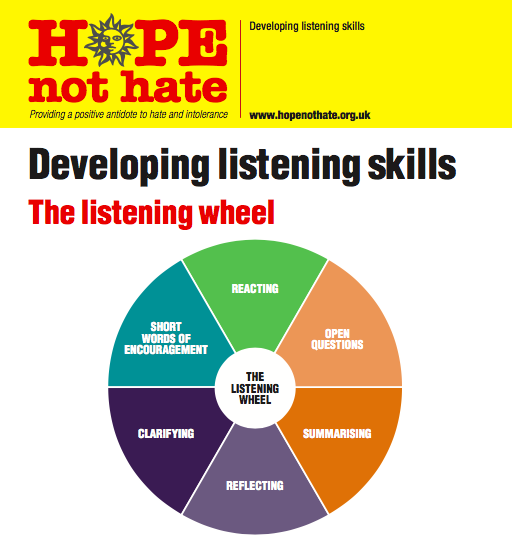Workshop 3 of the Narrative Change Lab – Effectively engaging the middle in constructive dialogue in the migration debate
This 3rd workshop of the Narrative Change Lab was conducted on November 8th and 9th, 2018 in partnership with HOPE not hate with two of their experienced community organisers/trainers, Arun Devisa & Nick Spooner, who facilitated most of the workshop based on their Difficult Conversations module.
One of the challenges of public campaigns targeting to the movable/anxious middle is how to constructively engage an often-sceptical audience in a dialogue about migration, and stay civil but firm through the tough questions. Done well, such an approach can have powerful outcomes, but it takes preparation, both tactical and emotional, and these challenges and opportunities were the focus of this workshop. Following the earlier stages of the Lab and the development and testing of two campaigns reaching out to the middle, the workshop focused on the 3rd stage of ICPA’s Narrative Change Campaign Planning Process – Preparing for Responses. The aim of this workshop is:
“to build the capacity and provide the tools and inspiration to prepare campaigners to effectively engage middle audiences in a dialogue that puts the values of diversity and inclusion back on the agenda in a convincing and emotionally smart manner”

A selection of shots from the workshop
This workshop was very timely for the group, as we had all witnessed the testing of the campaign materials in focus groups with middle audiences and could see the challenges and opportunities of effectively engaging the group in often divisive conversations. Led by Nick and Arun, we were immersed in the experiences of challenging campaigning done in the UK and could hear how much devotion, skill and bravery it takes to change anti-migrant rhetoric on the doorstep. From taking their newest members by the hand, through researching opposition voices, and learning how to take a step back and use empathethic listening and Socratic questioning techniques to open conversations with one simple question: “Why do you say that?”, Nick and Arun shared their most valuable experiences and tools with the whole group throughout the two-days.

An example of one of the Hope Not Hate tools for activists preparing for such conversations1
We also spent time role playing challenging situations and attempting to employ the techniques shared. We all learned that it takes a significant investment of time to build your ‘emotional armour’ and not lose your balance in such conversations.
Nick and Arun also wrote about their trip to Berlin and shared this experience2 :
“One of the highlights of the trip occurred during the ‘Story of Self’ workshop, based on the theoretical approach of former community organiser and political strategist, Marshall Ganz. During the session Nadia, an activist with the fantastic group JUMA (‘Jung, Muslimisch, Aktiv’ – ‘Young, Muslim, Active’) moved some attendees to tears with her brilliantly executed story about challenges she faced growing up and why she felt drawn to activism”.
In addition to introducing these techniques, we also discussed the process of preparing a campaign team and putting together talking points.
Some evaluative quotes from participants:
- “I've learned about the idea of reaching out beyond our bubble & how to lead conversations with folks that fundamentally disagree with us.”
- “It was extremely beneficial and gave great insight & feedback into how to tackle issues while engaging the middle.”
- “Fun, interesting, challenging, intense – I've learned a lot that I hope to be able to use in practice.”
We would especially like to thank HOPE not hate, Nick and Arun for their insightful and inspirational contribution to the Lab and look forward to co-operating in the future.